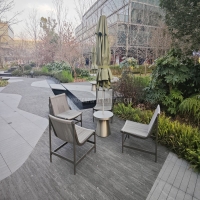Welcome to the website for landscape facilities products and knowledge.
How do landscape tables perform in areas with high levels of agricultural chemicals?
Landscape tables are a popular choice for outdoor spaces, but their performance in areas with high levels of agricultural chemicals is a critical consideration. Agricultural chemicals, such as pesticides, herbicides, and fertilizers, can degrade many materials over time. However, modern landscape tables are often designed with durability in mind, using materials like powder-coated steel, treated wood, or high-density polyethylene (HDPE) that resist chemical corrosion.
Powder-coated steel tables offer excellent resistance to chemical exposure, as the coating acts as a barrier against corrosive agents. Treated wood, while organic, can be infused with preservatives to enhance its longevity in chemically rich environments. HDPE tables are particularly resilient, as they are non-porous and immune to chemical absorption, making them ideal for farms or vineyards where chemical use is frequent.
Regular maintenance, such as rinsing off chemical residues and applying protective sealants, can further extend the lifespan of landscape tables. Choosing the right material and upkeep routine ensures these tables remain functional and aesthetically pleasing, even in chemically intensive areas.
In summary, landscape tables can perform well in high-chemical environments if constructed from the right materials and properly maintained. Investing in chemical-resistant options ensures long-term durability and value.
Related search:

Recommendation
Metal structure rattan chair without armrests for single person, with woven seat and backrest.